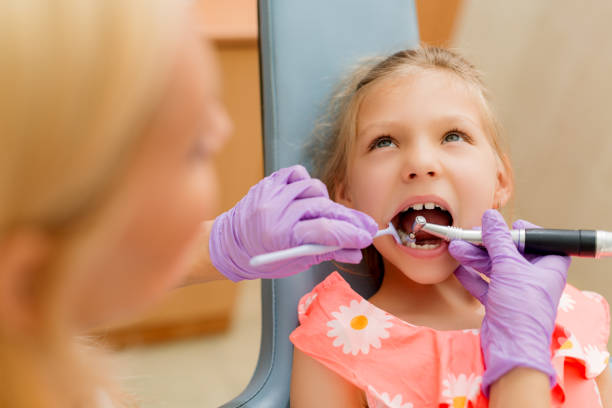Preventative Dental Care
Preventing Problems Before They Start
At Pediatric Dentistry, we believe that the best way to maintain a healthy smile is through prevention. Our preventative dental care services focus on stopping dental problems before they even begin.
By providing regular checkups, fluoride treatments, dental sealants, and personalized care, we help ensure that your child’s teeth remain strong and healthy for years to come.
Prevention is the key to avoiding more serious, painful, and costly dental issues down the road, and our team is dedicated to making sure your child has the best chance for a healthy smile.


Why Preventative Care is Important
Preventative dental care is essential in maintaining not only your child’s oral health but their overall well-being.
When dental issues like cavities, tooth decay, or gum disease are left untreated, they can lead to pain, infections, and even affect your child’s ability to eat or speak properly.
By focusing on prevention, we can protect your child from these common dental problems and keep their smile healthy and bright. Our goal is to make dental visits a positive experience while reducing the need for more invasive treatments in the future.
Regular Cleanings and Exams
Routine dental cleanings and exams are at the heart of our preventative services. During each visit, we thoroughly clean your child’s teeth, removing plaque and tartar buildup that regular brushing can’t always reach. Regular cleanings help prevent cavities and gum disease while keeping your child’s teeth sparkling clean. Our dentists will also perform a comprehensive exam to check for any signs of dental issues, ensuring early detection and treatment if needed.
We recommend scheduling dental exams every six months to stay ahead of any potential problems. Regular visits allow us to track your child’s dental development and provide timely advice to ensure their teeth are growing correctly.
Fluoride Treatments
Fluoride is a mineral that strengthens tooth enamel and makes it more resistant to decay. During your child’s visit, we apply a safe fluoride treatment that helps protect their teeth from cavities. This simple, painless treatment is especially important for children, as their developing teeth are more vulnerable to decay. Regular fluoride treatments, combined with good brushing habits, provide an extra layer of protection against cavities and tooth decay.
Dental Sealants
Cavities often form in the grooves and pits of molars, where food and bacteria can become trapped despite regular brushing. To prevent cavities from forming in these areas, we offer dental sealants. Sealants are a thin, protective coating applied to the chewing surfaces of your child’s molars. This coating acts as a barrier, sealing out food particles and bacteria that could lead to decay. Sealants are especially beneficial for children, as their newly erupted molars are more susceptible to cavities. The application is quick, painless, and can help prevent cavities for years.
Customized Oral Health Education
In addition to our in-office treatments, we work closely with both children and parents to promote good oral hygiene habits at home. We provide personalized tips and techniques for brushing, flossing, and maintaining a cavity-free smile. Our team takes the time to educate children in a fun and engaging way, helping them understand the importance of taking care of their teeth. We believe that prevention starts at home, and we’re here to support you every step of the way.
Long-Term Benefits of Preventative Care
By investing in preventative dental care, you’re helping to ensure that your child’s teeth and gums stay healthy throughout their life. Regular checkups, fluoride treatments, and sealants can significantly reduce the risk of cavities, tooth decay, and gum disease. Preventative care is a proactive approach that saves time, money, and discomfort in the future. It also helps your child develop a positive attitude toward dental visits, making their experience stress-free and enjoyable.
- Regular dental cleanings and exams to keep teeth clean and identify issues early
- Fluoride treatments to strengthen enamel and prevent tooth decay
- Dental sealants to protect molars from cavities
- Personalized oral health education to promote good habits at home
Your Questions Answered
Your child deserves honest dental care tailored to their needs. We’ll listen to your concerns and recommend proven treatments.
The American Academy of Pediatric Dentistry recommends bringing your child in to see us by their first birthday. Though this may sound early, we can teach you proper pediatric oral hygiene techniques, check for cavities, and watch for developmental problems.
Various forms of tooth decay can affect babies and small children. Early childhood cavities (tooth decay) can develop rapidly, progressing from the hard outer enamel layer of a tooth into the softer inner dentin in six months or less. Most of all, we want to ensure your child has a positive experience at our office and will be a regular visitor for years to come.
The specialized field of pediatric dentistry exists because a child’s mouth differs largely from an adult’s mouth. As pediatric dentists, we have an over 35 years of experience. Our specialized field covers the oral health of children, and our education and experience prepare us for the unique needs of children, infants, and adolescents. We also tend to those who have special healthcare needs.
The American Association of Orthodontics recommends children receive an orthodontics screening by the age of seven. It is important for us to evaluate the development of your child’s incoming adult teeth. If your child is not in need of more aggressive orthodontic treatment, we will address dental issues once more of their permanent teeth are in place, and their jaw is developed.
A lifetime of good oral health begins during infancy, even before the baby’s first tooth emerges. We have provided some guidelines below to help new parents!
Generally, the first baby teeth that appear are usually the lower front teeth and can appear between six and nine months of age. All babies are unique, so it’s not unusual if your child’s teeth emerge before or after this age. When their first teeth emerge, it’s time to transition to a baby toothbrush.
As more teeth appear, the American Academy of Pediatrics (AAP) recommends that you start brushing your child’s teeth with a small amount of fluoride toothpaste the size of a grain of rice. Gently brush the inside and outside of your baby’s teeth, as well as their tongue. Since a tiny amount of toothpaste is being used, there is no need to rinse.
A lifetime of good oral health begins during infancy, even before the baby’s first tooth emerges. We have provided some guidelines below to help new parents!
It’s a good idea to get into the habit of wiping your baby’s gums with gauze or a soft, wet washcloth to remove any sugars, milk, or residual food. Simply wrap the gauze or cloth around your index finger and gently rub it over their gums. There is no need to use any toothpaste yet.
One serious form of dental decay among young children is baby bottle tooth decay. This condition is caused by frequent and long exposures of an infant’s teeth to liquids that contain sugar. Among these liquids are milk (including breast milk), formula, fruit juice, and other sweetened drinks.
Putting a baby to bed for a nap or at night with a bottle other than water can cause serious and rapid tooth decay. Sweet liquid pools around the child’s teeth, allowing plaque bacteria to produce acids that attack tooth enamel. If you must give the baby a bottle as a comforter at bedtime, it should contain only water. If your child doesn’t fall asleep without the bottle and their usual beverage, gradually dilute the bottle’s contents with water over two to three weeks.
After your child’s teeth erupt, you can use a smear size amount of baby toothpaste and a soft baby toothbrush. When children reach three years of age, we advise parents to supervise their child’s teeth brushing and make sure they only use a pea-sized amount of toothpaste. Your child mustn’t swallow the toothpaste.
Poor oral health or a diet high in sugary foods can lead to cavities in your child’s mouth. When children don’t brush or floss well or often enough, the bacteria in their mouths feed on the sugars that are left behind on their teeth. This develops into plaque and eventually tartar, leading to tooth decay.
If plaque and tartar are not removed, it can cause decay, cavities, periodontal disease, and other oral health problems. Your child may experience discomfort when eating and drinking hot or cold foods as a result of tooth decay. It’s important to see your pediatric dentist at one of our Texas offices as soon as possible if your child is experiencing any pain so that we can ensure no decay could spread.
Here are a few ways to prevent tooth decay for your child:
- Brush and floss daily
- Use fluoridated toothpaste
- Use an antibacterial mouthwash
- Take your child for regular dental checkups and cleanings; preventative care is essential for healthy gums and teeth
- Ask our Texas pediatric dentist about dental sealants which can prevent cavities and benefit tooth strengthening
- Chew sugar-free gum
- Limit your child’s intake of sugary foods and drinks
Book A Visit
Contact Us
We’re always welcoming new patients. We can’t wait to meet you!
